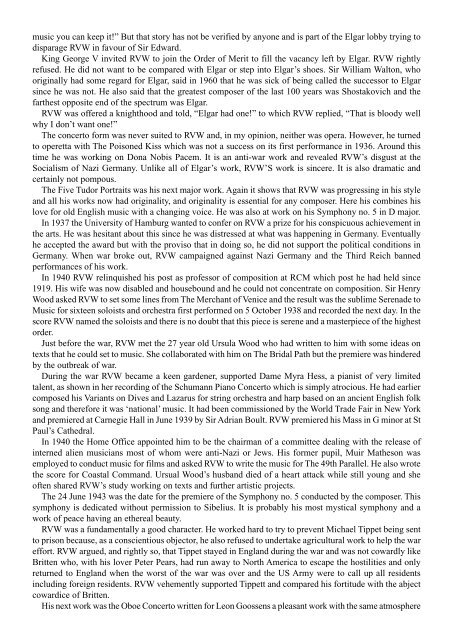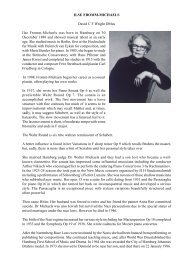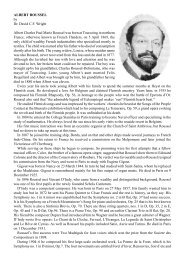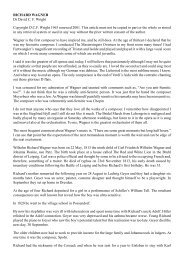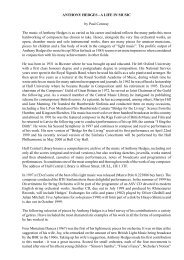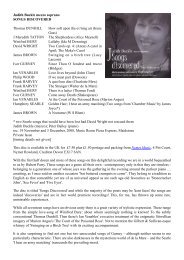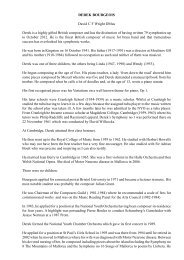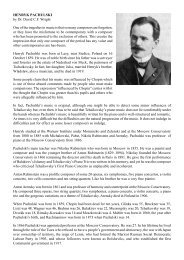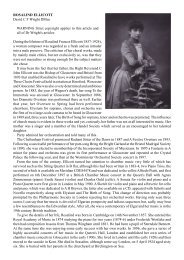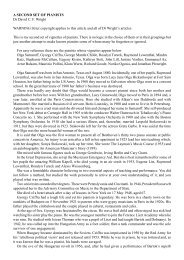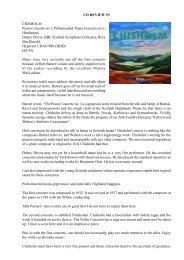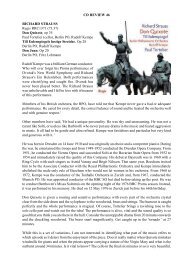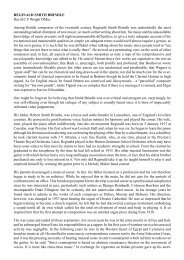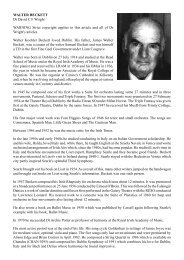Ralph Vaughan Williams - Dr David Wright
Ralph Vaughan Williams - Dr David Wright
Ralph Vaughan Williams - Dr David Wright
Create successful ePaper yourself
Turn your PDF publications into a flip-book with our unique Google optimized e-Paper software.
music you can keep it!” But that story has not be verified by anyone and is part of the Elgar lobby trying todisparage RVW in favour of Sir Edward.King George V invited RVW to join the Order of Merit to fill the vacancy left by Elgar. RVW rightlyrefused. He did not want to be compared with Elgar or step into Elgar’s shoes. Sir William Walton, whooriginally had some regard for Elgar, said in 1960 that he was sick of being called the successor to Elgarsince he was not. He also said that the greatest composer of the last 100 years was Shostakovich and thefarthest opposite end of the spectrum was Elgar.RVW was offered a knighthood and told, “Elgar had one!” to which RVW replied, “That is bloody wellwhy I don’t want one!”The concerto form was never suited to RVW and, in my opinion, neither was opera. However, he turnedto operetta with The Poisoned Kiss which was not a success on its first performance in 1936. Around thistime he was working on Dona Nobis Pacem. It is an anti-war work and revealed RVW’s disgust at theSocialism of Nazi Germany. Unlike all of Elgar’s work, RVW’S work is sincere. It is also dramatic andcertainly not pompous.The Five Tudor Portraits was his next major work. Again it shows that RVW was progressing in his styleand all his works now had originality, and originality is essential for any composer. Here his combines hislove for old English music with a changing voice. He was also at work on his Symphony no. 5 in D major.In 1937 the University of Hamburg wanted to confer on RVW a prize for his conspicuous achievement inthe arts. He was hesitant about this since he was distressed at what was happening in Germany. Eventuallyhe accepted the award but with the proviso that in doing so, he did not support the political conditions inGermany. When war broke out, RVW campaigned against Nazi Germany and the Third Reich bannedperformances of his work.In 1940 RVW relinquished his post as professor of composition at RCM which post he had held since1919. His wife was now disabled and housebound and he could not concentrate on composition. Sir HenryWood asked RVW to set some lines from The Merchant of Venice and the result was the sublime Serenade toMusic for sixteen soloists and orchestra first performed on 5 October 1938 and recorded the next day. In thescore RVW named the soloists and there is no doubt that this piece is serene and a masterpiece of the highestorder.Just before the war, RVW met the 27 year old Ursula Wood who had written to him with some ideas ontexts that he could set to music. She collaborated with him on The Bridal Path but the premiere was hinderedby the outbreak of war.During the war RVW became a keen gardener, supported Dame Myra Hess, a pianist of very limitedtalent, as shown in her recording of the Schumann Piano Concerto which is simply atrocious. He had earliercomposed his Variants on Dives and Lazarus for string orchestra and harp based on an ancient English folksong and therefore it was ‘national’ music. It had been commissioned by the World Trade Fair in New Yorkand premiered at Carnegie Hall in June 1939 by Sir Adrian Boult. RVW premiered his Mass in G minor at StPaul’s Cathedral.In 1940 the Home Office appointed him to be the chairman of a committee dealing with the release ofinterned alien musicians most of whom were anti-Nazi or Jews. His former pupil, Muir Matheson wasemployed to conduct music for films and asked RVW to write the music for The 49th Parallel. He also wrotethe score for Coastal Command. Ursual Wood’s husband died of a heart attack while still young and sheoften shared RVW’s study working on texts and further artistic projects.The 24 June 1943 was the date for the premiere of the Symphony no. 5 conducted by the composer. Thissymphony is dedicated without permission to Sibelius. It is probably his most mystical symphony and awork of peace having an ethereal beauty.RVW was a fundamentally a good character. He worked hard to try to prevent Michael Tippet being sentto prison because, as a conscientious objector, he also refused to undertake agricultural work to help the wareffort. RVW argued, and rightly so, that Tippet stayed in England during the war and was not cowardly likeBritten who, with his lover Peter Pears, had run away to North America to escape the hostilities and onlyreturned to England when the worst of the war was over and the US Army were to call up all residentsincluding foreign residents. RVW vehemently supported Tippett and compared his fortitude with the abjectcowardice of Britten.His next work was the Oboe Concerto written for Leon Goossens a pleasant work with the same atmosphere


